June 14, 2025 | 04:56 GMT +7
June 14, 2025 | 04:56 GMT +7
Hotline: 0913.378.918
June 14, 2025 | 04:56 GMT +7
Hotline: 0913.378.918
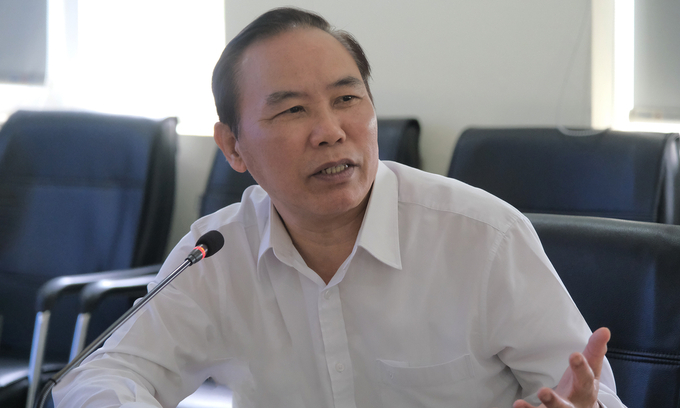
Deputy Minister Phung Duc Tien called on scientists to actively renew their mindset in research activities. Photo: Bao Thang.
Reporting to the delegation of the Ministry of Agriculture and Rural Development (MARD) on the morning of May 26, Dr. Mai Van Trinh, Director of the Institute for Agricultural Environment (IAE), said, “Established in 2008, the institute can be considered the ‘youngest child’ in the common house of the Vietnam Academy of Agricultural Sciences (VAAS). As of April 2023, the Institute has 109 staff members, including 1 Assoc. PhD, 15 PhDs and 56 Masters”.
The institute’s key tasks include conducting scientific research and proposing solutions to overcome pollution and degradation of the agricultural and rural environment; monitoring and analyzing the quality of the agricultural and rural environment; participating in providing public services for national supervision of food quality and safety.
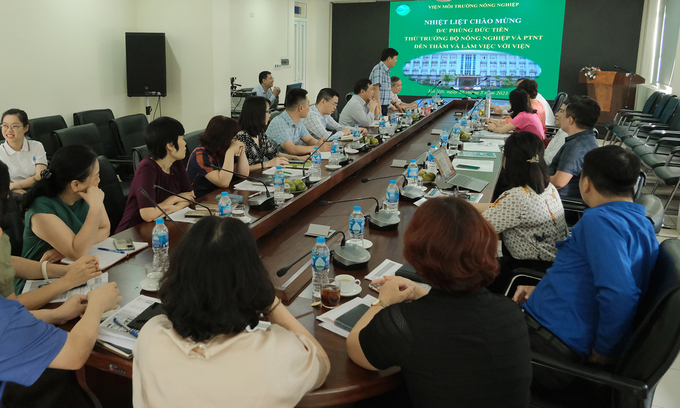
The delegation of the Ministry of Agriculture and Rural Development worked with the Institute for Agricultural Environment on May 26. Photo: Bao Thang.
The Institute for Agricultural Environment is also the focal point that joins the national environmental monitoring network, including one center and two monitoring stations located in all three regions. Every year, the institute conducts regular monitoring at 63 soil monitoring points across the country.
IAE provides regular data on soil environment quality to the Ministry of Natural Resources and Environment in the preparation of the annual "National State of the Environment Report" as well as data to serve the work of agroproduction directing of the Ministry of Agriculture and Rural Development in the localities.
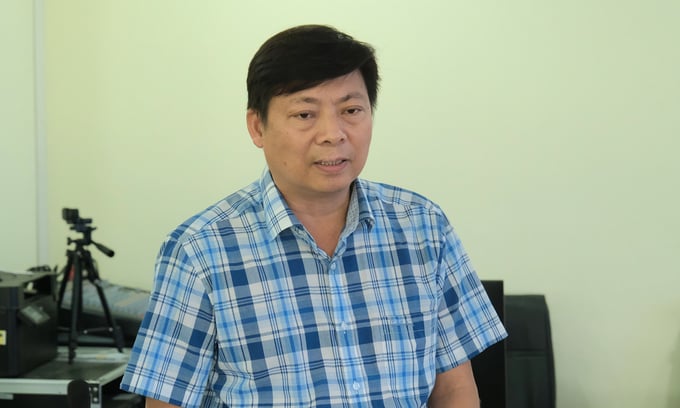
Dr. Mai Van Trinh presented the report to the delegation of the Ministry of Agriculture and Rural Development. Photo: Bao Thang.
Being a research institute with a wide spectrum of activities, the Institute of Agricultural Environment has not received any scientific topics from the Ministry of Agriculture and Rural Development since 2010.
Elaborating on this matter, Dr. Ha Manh Thang, Head of the Department of Environmental Chemistry, said that researchers are facing many difficulties in ensuring income. Since operating under an autonomous mechanism, the state budget is currently only guaranteeing 7 months' salary for the Institute's staff. In the remaining 5 months, the IAE leaders along with other officials and employees are on their own.
Due to the peculiarity that the institute was formed by merging many units, the mission of the Institute for Agricultural Environment is entangled with many other research units in the Ministry of Agriculture and Rural Development such as the Institute of Plant Protection and the Soil and Fertilizers Institute.
"Over time, the burden of putting food on the table weighs heavily on our research staff, affecting everyone's enthusiasm for dedication. In addition, the ability to contact channels and programs of ministries, departments, industries and localities remains a challenge for us," said Mr. Thang.
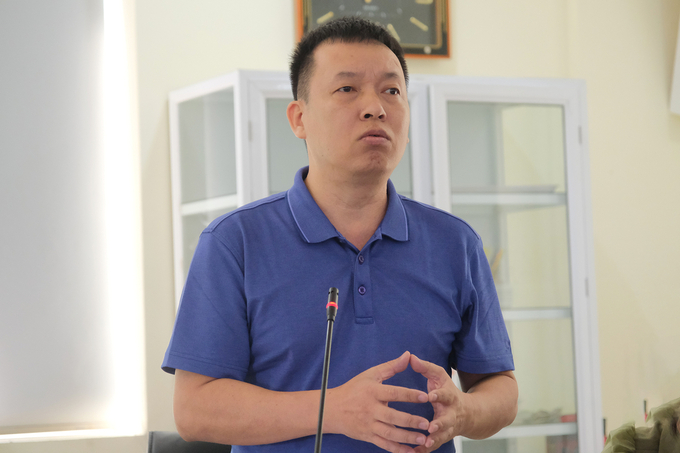
Dr. Luong Huu Thanh, Head of the Department of Environmental Biology, mentioned the difficulties in the current research work. Photo: Bao Thang.
Head of Environmental Biology Department Dr. Luong Huu Thanh stated the fact. In addition to struggling to make a living, the biggest problem is that IAE has not been invested or encouraged in terms of basic research with application purposes. The institute is hardly able to solve the urgent and topical issues posed by society.
Listening to opinions from the Institute for Agricultural Environment, Deputy Director of the Department of Science, Technology and Environment Nguyen Giang Thu said that the agricultural sector always does its best to invest in research projects on the environment. In 2022, the amount of funding given to projects in this field is VND 10 billion. To increase revenue for research activities, Ms. Thu suggested IAE leaders focus more on strengths such as organic agriculture, carbon credits, and at the same time strengthen cooperation with localities.
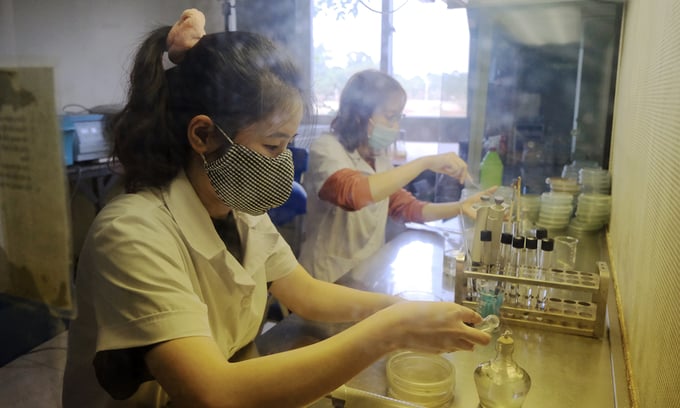
Young research officer of the Department of Environmental Biology, Institute for Agricultural Environment. Photo: Bao Thang.
Upon colluding the meeting, Deputy Minister of Agriculture and Rural Development Phung Duc Tien laid out the orientation: "Agriculture without the environment would make it very difficult for our agro-products to enter the global value chain, especially now that many export markets have regulated carbon credits for product".
As an environmental research unit operating in the agricultural sector, the Institute for Agricultural Environment will have to face competition with specialized institutes when it comes to each specific field such as fisheries, livestock, and irrigation. Therefore, the MARD leader suggested that the institute propose or conduct research on interdisciplinary issues, solve the overarching tasks based on the new strategies and projects promulgated by the MARD.
Regarding IAE’s concerns related to operating costs, Deputy Minister Phung Duc Tien advised the institute to first improve its capacity by completing documents and diversifying services to link with businesses. Another plausible idea is to transfer the technologies that have created successful models to localities.
The Deputy Minister assigned the Department of Science, Technology and Environment to focus on orienting the work and tasks for each division and center of the Institute for Agricultural Environment, helping the institute's staff work with peace of mind. At the same time, he directed units under the Ministry of Agriculture and Rural Development to attach environmental indicators to agroproduction. This is important content to enhance the value of agro-products, helping Vietnamese products reach further into the world market.
Translated by Samuel Pham
/2025/06/13/5330-2-004539_953.jpg)
(VAN) Changing policy mindset and removing investment barriers are urgent requirements to open up new development space for enterprises in the agricultural sector.

(VAN) The areas include the restoration of five million hectares of marine ecosystems.

(VAN) Dr. Le Van Nguyen, Director of the Institute of E-Commerce Management (ECM), emphasizes the potential for green development through the cultivation of fruit trees, particularly in provinces such as Son La.

(VAN) VAAS and numerous Vietnamese enterprises have signed cooperation agreements with Japanese partners to promote agricultural technology and trade connectivity.
/2025/05/29/5625-12-214801_567.jpg)
(VAN) Provincial mergers in the Mekong Delta promise to streamline administration, expand inter-provincial raw material areas, and foster close linkages in agricultural value chains, benefiting both businesses and cooperatives.

(VAN) Merging Mekong Delta provinces contributes to the expansion of agricultural raw material areas, addressing previous constraints caused by provincial boundaries. Additionally, this expansion will reduce costs and strengthen linkages between businesses, cooperatives, and farmers.
/2025/05/29/1043-2-153730_145.jpg)
(VAN) The Government's policy to merge provincial-level administrative units opens up major opportunities for the Mekong Delta region to reshape its agricultural development strategy toward large-scale production, effective regional linkages, and sustainability.